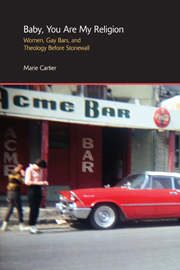Book contents
- Frontmatter
- Dedication
- Contents
- Acknowledgments
- Preface: Myrna's story
- 1 It was the only place
- Part I Interviews
- 2 The 1940s: “Thank God the Japanese surrendered”.
- 3 The 1950s: “I should have made a list of my girlfriends!”
- 4 The 1960s: “It was … Hollywood! We did a girlfriend … daisy chain!”
- 5 The 1970s: “We were … women in overalls dancing with women in overalls. they kicked us out.”
- 6 The 1980s: “I really did think I was Jess from Stone Butch Blues reincarnated.”
- Part II Theological history and contexts
- Part III The nature of “theology”
- Appendix A Demographics
- Appendix B Sources
- Bibliography
- Index
6 - The 1980s: “I really did think I was Jess from Stone Butch Blues reincarnated.”
from Part I - Interviews
- Frontmatter
- Dedication
- Contents
- Acknowledgments
- Preface: Myrna's story
- 1 It was the only place
- Part I Interviews
- 2 The 1940s: “Thank God the Japanese surrendered”.
- 3 The 1950s: “I should have made a list of my girlfriends!”
- 4 The 1960s: “It was … Hollywood! We did a girlfriend … daisy chain!”
- 5 The 1970s: “We were … women in overalls dancing with women in overalls. they kicked us out.”
- 6 The 1980s: “I really did think I was Jess from Stone Butch Blues reincarnated.”
- Part II Theological history and contexts
- Part III The nature of “theology”
- Appendix A Demographics
- Appendix B Sources
- Bibliography
- Index
Summary
I Want a Twenty-Four-Hour Truce During Which There Is No Rape
OVERVIEW
I came out in a consciousness raising group in the 80s, a feminist consciousness raising group, ALICE—Alliance for Lesbians Interested in Consciousness Expansion. They did not understand butch-femme. I knew I was butch, but I tried to be androgynous. Then I read Joan Nestle. I wished so often that I had been born in the 50s so that I could be part of that time and fit in.
After I read Stone Butch Blues, I related so much to Leslie Feinberg's character that I seriously thought maybe I was Jess [the main character] reincarnated. I actually sort of believed that for a while.
The 1980s were when butch-femme came back into fashion. The Barnard Conference in 1982 officially started what became known as the “lesbian sex wars.” The Conference was to take place in 1981 and word of invited speakers became known to some members of Women Against Pornography (WAP). Tis group was strongly associated with feminist writer and anti-porn advocate, Andrea Dworkin, who was one of the founding members of the New York group, along with Adrienne Rich, Grace Paley, Gloria Steinem, Shere Hite, Robin Morgan, and others. Included in the speaker list for the conference was Gayle Rubin, founder of Samois, the first lesbian feminist sadomasochist group. Also included in the list of speakers were Joan Nestle and Dorothy Allison.
- Type
- Chapter
- Information
- Baby, You Are My ReligionWomen, Gay Bars, and Theology Before Stonewall, pp. 136 - 157Publisher: Acumen PublishingPrint publication year: 2013



